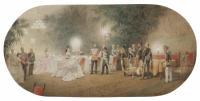Event
14 Feb 2020, 5:30pm Nihon Room, Pembroke College, Cambridge
All students know that we are more likely to learn from a teacher who excites us, stirs our curiosity, and indeed our passion for wonder. This lecture introduces a multilingual illustrated dictionary made in sultanate India that immersed its readers in an aesthetic education through sound and wonder. The illustrated manuscript of interest is the Key of the Learned (Miftāḥ al-Fużalā, British Library Or 3299) attributed to Mandu circa 1490. Although the Key of the Learned contains quadruple the number of illustrations in comparison to Mandu’s famed Book of Delights (Ni‘matnāmah), it has received minimal scholarly attention. This study thus opens up new vistas onto sultanate book culture and has broader implications for early modern art well into the sixteenth century. The Miftāḥ al-Fużalā’s definitions encompass nearly every facet of Indo-Islamicate art history. It provides a critical vocabulary for subjects including musical instruments, textiles, metalwork, jewelry, arms and armor, and architecture. The information transmitted by the Miftāḥ is not limited to the Persian, Hindavi, and Arabic language of the text, but also the visual knowledge depicted in paintings. This study thus argues that the Miftāḥ’s manuscript as a whole has a close relationship to the genre of the Islamicate cosmography and reveals its author’s penchant for wonder.
Vivek Gupta is completing his PhD at SOAS University of London in History of Art. His thesis, Wonder Reoriented: Manuscripts and Experience in Islamicate Societies of South Asia (ca. 1450—1600), examines a corpus of illustrated compendia of wonders in Persian, Arabic, and vernacular Indic languages.
Image credits: British Library Or 3299, f. 161a, pearl-borer
Click to read more
